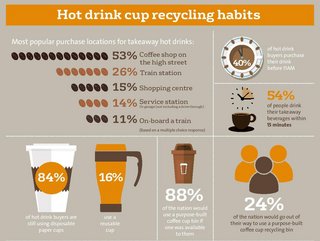Veolia partners with Starbucks and Costa to unveil takeaway cup waste solution

Recent YouGov research shows that over half of regular takeaway hot drink consumers – meaning ones that buy at least four a week – dispose of the cups at work. In response to this wasteful issue, the UK’s leading resource management company, Veolia, is introducing a nationwide solution to make takeaway coffee cups more easily recyclable.
Veolia has been supported by mainstream partners such as Starbucks and Costa on this venture to collect takeaway cups as soon as consumers have finished with them. The solution is now available across the country as part of a packaged service which offers multiple options, including a specialist in-house recycling bin, a bulk collection option, and a post-back service. It is available to all types of business nationally.
Veolia hopes that by gathering cups before they can enter general waste stream, its solution will get a higher quality of material that can be processed into new products. 88 percent of the public have stated that they would use a purpose-built recycling bin for disposable paper cups, and 47 percent would even hold onto their cup for longer in order to use this type of bin at a later time if there was one nearby. 24 percent would go out of their way to use one.
Estelle Brachlianoff, Senior Executive Vice-President at Veolia UK & Ireland, said: “Over the last six months a lot of activities have been taking place with our customers, such as Costa and Starbucks to overcome our biggest challenge – contamination in the cups. As a result, we’ve worked on a solution that will separate the cup from the general waste stream as soon as the customer has enjoyed their drink.
“The research highlights the integral role we all play in creating a sustainable future by ensuring our resources are kept in the loop for longer. When it comes to coffee cups, I’d like to take this opportunity to further encourage a mass collaboration between designers, manufacturers, vendors and consumers as we all have a part to play in the ultimate solution – as well as those less obviously involved in helping to recycle coffee cups, such as offices, campuses and train stations.”
Veolia’s ‘tip-it, flip-it, stack-it’ process ensures remaining liquid is drained and the lid, sleeve, and cup are separated, at which point the company undertakes a secondary exercise to ensure any rogue items are removed. With the cups checked for quality and contamination, they are send to paper pulping facilities and could then go on to create other products, like egg boxes or cup holders, to give back out in stores.






